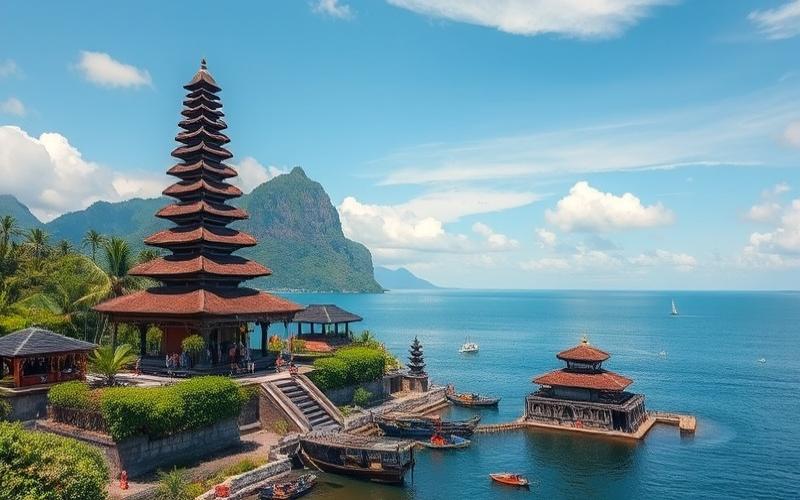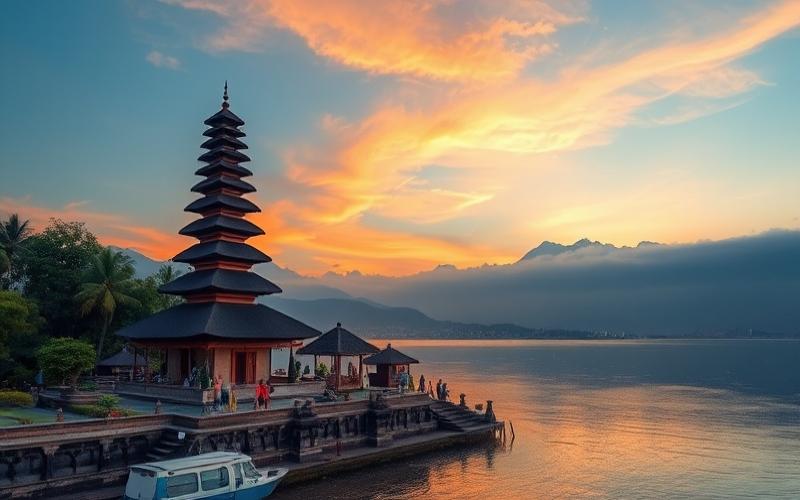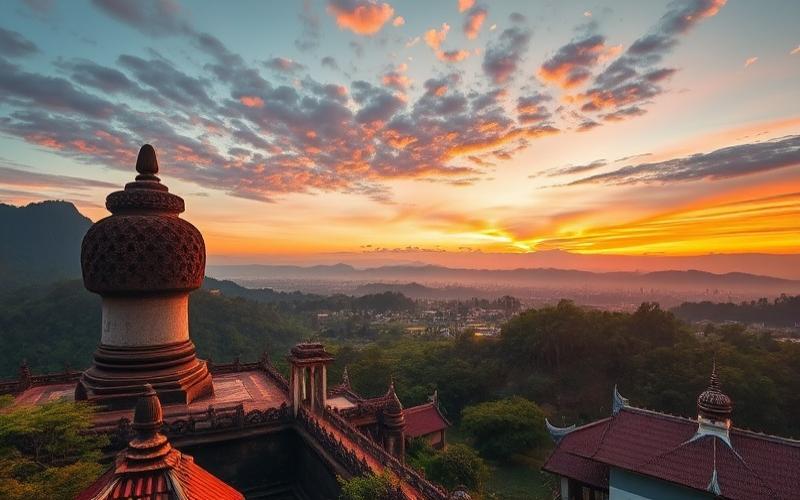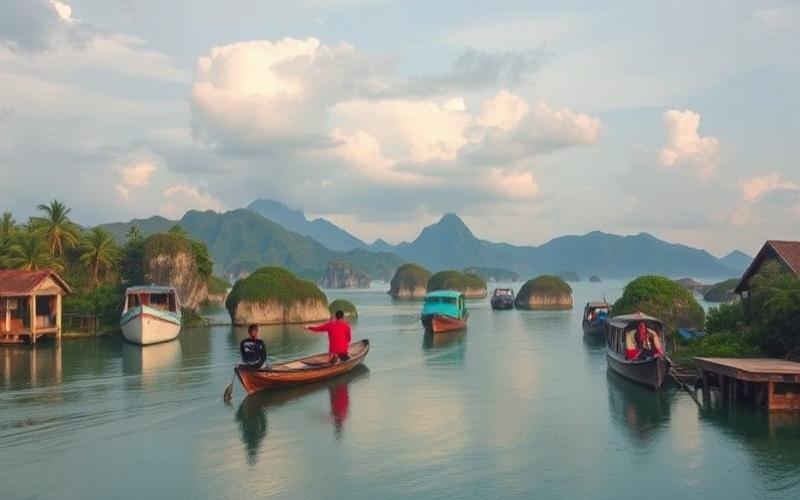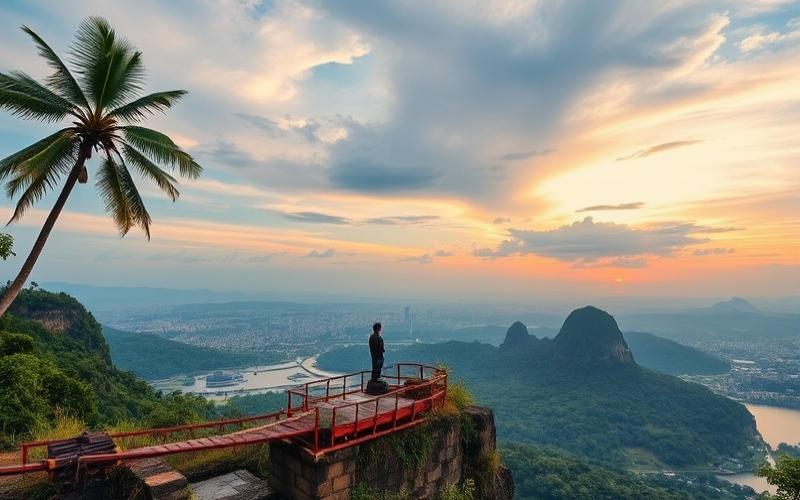
 Published on and written by Cyril Jarnias
Published on and written by Cyril Jarnias
Indonesia, an archipelago of unparalleled cultural richness, is a country where diverse religious traditions coexist, captivating and intriguing in equal measure. For expatriates settling here, understanding these practices becomes essential not only for fostering harmonious integration but also for enriching their personal experience.
This guide aims to enlighten newcomers about the nuances and customs of this religious mosaic, offering keys to navigating serenely through an environment where spirituality profoundly influences social interactions and daily life.
Guaranteed immersion into the heart of unique spiritual diversity, this welcoming journey is an invitation to discover and respect local traditions, opening the door to an authentic and multisensory Indonesia.
Introduction to Religious Practices in Indonesia
Main Religions Practiced in Indonesia
- Islam (approximately 87% of the population): Majority religion and pillar of Indonesian national identity.
- Christianity (approximately 11%), divided into Protestants and Catholics, mainly present in Papua, Timor, and certain regions of North Sumatra and Maluku.
- Hinduism (primarily in Bali, where it represents nearly 86% of the local population).
- Buddhism and Confucianism (minorities, particularly within the Chinese community).
- Traditional animist beliefs: Still alive in certain rural regions and among some indigenous peoples.
| Religion | Share of Population | Predominant Regions |
|---|---|---|
| Islam | ~87% | Java, Sumatra, Kalimantan |
| Christianity | ~11% | Papua, Timor, Maluku |
| Hinduism | <2% | Bali |
Main Religious Holidays and Their Impact on Daily Life
Eid al-Fitr (Hari Raya Idul Fitri)
A major Muslim holiday, Eid al-Fitr marks the end of the fasting month of Ramadan. It is celebrated throughout the archipelago, particularly in Java and Sumatra.
Rituals and Traditions
Early morning collective prayers, family visits, exchange of wishes and offerings, distribution of alms (zakat), and sharing of traditional dishes like ketupat (rice cooked in coconut leaves).
Impact on Daily Life
- Widespread closure of businesses, government offices, schools, and shops, sometimes for a week.
- Significant reduction in work hours before and after the holiday.
- Mass movement of the population to hometowns (“mudik” phenomenon), causing traffic jams and restrictions or disruptions in public transport.
- Intense community activities: collective meals, charity work, neighborhood celebrations.
Expatriate Participation
Respect local customs, avoid professional meetings during the period, offer wishes to Muslim colleagues and neighbors, participate in festivities if invited.
Nyepi (Balinese Hindu New Year)
Nyepi is unique to Bali, celebrating the New Year according to the Hindu Saka calendar.
Rituals and Traditions
- Melasti purification ceremony two days prior.
- Ogoh-Ogoh (monster statue) parades the evening before, followed by the Ngrupuk ritual (destruction of effigies).
- On Nyepi day: absolute silence, fasting, meditation, prohibition from going out, traveling, using electricity, or engaging in any activity.
Impact on Daily Life
- Total closure of shops, airports, and ports.
- Prohibition of road travel, even for tourists.
- The entire island observes an almost supernatural calm.
Expatriate Participation
- Obligation to respect the silence, stay at the hotel or home, avoid any outdoor or noisy activities, anticipate purchases and travel.
- Opportunity to discover Balinese spirituality by participating in pre-Nyepi ceremonies.
Galungan and Kuningan (Balinese Hindu Holidays)
Galungan celebrates the victory of Dharma (good) over Adharma (evil) and the return of ancestors to homes, followed ten days later by Kuningan, marking the departure of the spirits.
Rituals and Traditions
- Installation of penjor (decorated bamboo arches) in front of every house.
- Offerings and prayers in family temples.
- Barong (mythical creatures) parades in villages.
- Purification of worship objects during Kuningan.
Impact on Daily Life
- Closure of many shops and slowdown in government offices.
- Return of Balinese to their home villages.
- Increase in community and religious activities.
- Maintenance of tourist activity in major hotels.
Expatriate Participation
Respect processions and decorations, avoid disturbing ceremonies. Possibility to attend festivities, adopting respectful attire and learning about local customs.
Christmas (Hari Natal)
Christian holiday celebrated mainly in regions with strong Christian populations (Papua, Ambon, Flores, Manado).
Rituals and Traditions
Midnight masses, Christmas carols, decorations, gift exchanges, festive family meals.
Impact on Daily Life
- Partial closure of shops and offices in affected areas.
- Modifications to work schedules.
- Community and charitable activities, shows, and Christmas markets.
Expatriate Participation
Welcome participation in masses and festivities. Respect local customs (appropriate attire, politeness). Possibility to organize private events in harmony with the local community.
| Holiday | Religion | Main Rituals | Business Closures | Transport Restrictions | Expatriate Participation |
|---|---|---|---|---|---|
| Eid al-Fitr | Islam | Prayers, visits, food sharing | Widespread | Major disruptions | Respect, wishes, invitations |
| Nyepi | Hinduism | Silence, fasting, ceremonies | Total in Bali | Total prohibition | Respect silence, plan ahead |
| Galungan/Kuningan | Hinduism | Offerings, penjor, parades, purification | Partial closure | Slowdown | Respectful participation |
| Christmas | Christianity | Masses, meals, gifts | Partial (Christian regions) | Minimal | Welcome participation |
Tips for Expatriates
- Research the holiday calendar in advance and anticipate service closures.
- Adopt a respectful and discreet attitude during rituals.
- Join celebrations if invited, observing local dress codes and protocols.
- Avoid scheduling professional events during major religious holidays.
- Use these moments to discover Indonesia’s cultural richness.
Good to Know:
During Nyepi, Bali’s Day of Silence, the island is completely paralyzed with a ban on movement, while Eid al-Fitr marks the end of Ramadan, leading to shop closures and increased travel. To integrate during Galungan, expatriates can respect local customs by participating in ceremonies and wearing traditional attire.
Behavioral Codes to Respect Local Practices
Understanding the different religions practiced in Indonesia is essential for respecting local practices and facilitating expatriate integration. The archipelago has six officially recognized religions: Islam, Hinduism, Buddhism, Christianity (Protestantism and Catholicism), and Confucianism. Religion holds a central place in daily life and national identity, influencing behaviors and social interactions.
| Religion | Key Practices to Respect | Specific Remarks |
|---|---|---|
| Islam | Daily prayers, mosques | Majority, especially in Java and Sumatra |
| Hinduism | Offerings, temple ceremonies | Prevalent in Bali |
| Buddhism | Meditation, temple rituals | Minority but visible |
| Christianity | Masses, religious holidays | Present in various regions |
Appropriate Behaviors in Places of Worship:
- Wear modest clothing: shoulders and knees covered.
- Use a sarong and scarf to enter Hindu temples.
- Remove shoes before entering a mosque or temple.
- Do not enter a temple during menstruation (for women).
- Avoid pointing or touching sacred objects.
- Respect silence during ceremonies and do not interrupt prayers or rituals.
- Ask permission before taking photos, especially during ceremonies.
- Refrain from public displays of affection in religious or public places.
Religious Holidays and Their Impact:
Religious holidays, such as Eid al-Fitr (end of Ramadan), Nyepi (Balinese Hindu New Year), Christmas, and Easter, modify work schedules and service availability.
During these periods, many shops close, transport may be disrupted, and residents participate in ceremonies with family or the community.
Expatriates must be flexible and adapt their organization according to these calendars.
Practical Tips for Better Understanding Local Sensitivities:
- Inquire with colleagues, neighbors, or local friends about religious customs specific to each region.
- Participate, when possible and appropriate, in events or ceremonies to observe and learn codes of conduct.
- Take time to interact with locals to better grasp the meaning of religious holidays and community practices.
- Respect instructions posted at the entrance of places of worship and ask for advice if in doubt.
- Adopt a humble and open attitude, avoiding judging or comparing local practices to those of your home country.
Respecting religious behavioral codes in Indonesia is a guarantee of good integration and mutual respect, helping to avoid awkwardness and fully experience local life.
Good to Know:
Respect local customs by removing your shoes before entering a place of worship and avoiding photography without permission during ceremonies. Religious holidays like Eid or Nyepi can lead to service closures; check with locals to plan your activities.
Resources for Expatriates Wishing to Practice Their Religion
Main Places of Worship for Expatriates in Indonesia
| Religion | Iconic Locations | City/Island | Special Features |
|---|---|---|---|
| Islam | Istiqlal Grand Mosque | Jakarta | Largest mosque in Southeast Asia, symbol of harmony with neighboring cathedral |
| Baiturrahman Grand Mosque | Banda Aceh | Major historical and spiritual site, survived the tsunami | |
| Palembang Grand Mosque | Palembang | Architecture blending local, European, and Chinese influences | |
| An-Nur Grand Mosque | Pekanbaru | Varied facilities (playground, library, date palms) | |
| Christianity | Jakarta Cathedral | Jakarta | Located opposite Istiqlal Mosque, symbol of interfaith cooperation |
| Emmanuel Reformed Church (Gereja Immanuel) | Jakarta | Historic Reformed Protestant place of worship | |
| Maria Bunda Segala Bangsa Parish Catholic Church | Bali (Puja Mandala) | Part of an interfaith complex | |
| Bukit Doa Protestant Church | Bali (Puja Mandala) | Part of an interfaith complex | |
| Hinduism | Pura Besakih | Bali | Mother Temple of Bali, major spiritual center |
| Pura Ulun Danu Bratan | Bali | Picturesque lakeside temple | |
| Pura Tanah Lot | Bali | Iconic seaside temple | |
| Jagat Natha Hindu Temple | Bali (Puja Mandala) | Part of an interfaith complex | |
| Buddhism | Vihara Buddha Guna | Bali (Puja Mandala) | Buddhist temple in a multidenominational complex |
Multidenominational Complexes
Puja Mandala (Bali): Brings together a mosque, Catholic and Protestant churches, a Hindu temple, and a Buddhist temple, facilitating practice for all communities and encouraging religious harmony.
Organizations and Resources for Expatriates
- Christian communities (Catholic, Protestant) present in major cities.
- Muslim associations and cultural centers for expatriates, particularly in Jakarta and Bali.
- Meditation and yoga groups open to foreigners.
- Online support platforms (forums, expatriate Facebook groups).
- Tourist guides and cultural centers offering visits and workshops on local religions.
- Hotel and resort services providing presentations on Balinese religion and culture.
Interfaith Events
- Shared religious holidays (e.g., Jakarta Cathedral opens its parking for Eid, Istiqlal Mosque for Christmas).
- Balinese festivals and ceremonies where foreign participation is possible (while respecting local framework).
Practical Tips for Contacting Religious Communities
- Go directly to places of worship before or after services to meet with leaders.
- Use social media or expatriate groups to obtain schedules and contacts.
- Ask for advice from local colleagues or already settled expatriates.
Important Cultural Considerations
- Respect dress codes (shoulders and legs covered in mosques and temples).
- Remove shoes before entering temples and mosques.
- Avoid proselytizing, considered inappropriate and sometimes illegal.
- Observe rituals and do not interrupt prayers or ceremonies.
- Ask for permission before photographing or participating in rituals.
Online Resources and Useful Applications
- Worship place locator apps (Google Maps, Muslim Pro for mosques, Catholic Mass Times for masses).
- Indonesian religious holiday calendars (official tourism sites, expatriate Facebook groups).
- Streaming platforms to follow religious services remotely.
- Expatriate community sites offering announcements of local religious events.
Key Takeaways
To live one’s faith in Indonesia, prioritize discretion, respectful curiosity, and intercultural dialogue. Religious harmony is valued, but each community has its sensitivities: integration comes through listening and respecting local customs.
Good to Know:
Main places of worship for expatriates in Indonesia include Istiqlal Grand Mosque, Jakarta Cathedral, and Besakih Hindu Temple; for interfaith events, check the Interfaith Indonesia app.
Disclaimer: The information provided on this website is for informational purposes only and does not constitute financial, legal, or professional advice. We encourage you to consult qualified experts before making any investment, real estate, or expatriation decisions. Although we strive to maintain up-to-date and accurate information, we do not guarantee the completeness, accuracy, or timeliness of the proposed content. As investment and expatriation involve risks, we disclaim any liability for potential losses or damages arising from the use of this site. Your use of this site confirms your acceptance of these terms and your understanding of the associated risks.








